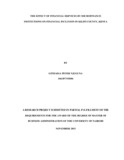| dc.description.abstract | Financial inclusion is the easy access to safe savings, appropriately designed loans for poor and low‐income households and for micro, small and medium‐sized enterprises, and suitable insurance and payments services. MFIs have been known to offer different services that include: deposit mobilization (savings), micro credits, money transfers and micro insurance. The purpose of this study was to establish the effects these financial services by Microfinance Institutions on financial inclusion in Kilifi County, Kenya. The study employed a descriptive survey research design. The targeted institutions for this study comprised all the 28 established MFIs operating in Kilifi County by administering questionnaires on 1 manager in each MFI and 5 randomly chosen customers of each MFI. Data collected by use of the questionnaire cleaned, coded and analyzed using Statistical Package for Social Scientists (SPSS). Data was presented in summary form using the frequency distribution tables, bar charts and pie charts. The study established positive correlation between deposit collection by MFIs and financial inclusion (persons correlation value = 0.417, P value .006). Further the research found that safeguarding members’ savings through insurance, liquidity ratio, and short-term security was vital in encouraging customer trust and participation therefore, the study found a positive correlation between provision of other services by MFIs and financial inclusion (persons correlation value = 0.450, P value 0.011). The research also found that, encouragement and provision of financial personal money management tactics could highly encourage participation and financial inclusion. The study found a positive correlation between lending by MFIs and financial inclusion (persons correlation value = 0.391, P value .023). The study also established that an increase in the level of income among residents would enhance financial inclusion. The study concludes that effectiveness in deposit collection, provision of other services by MFIs, lending strategies and level of income, all enhanced financial inclusion. In order to enhance financial inclusion, the management of MFIs in Kilifi County need to enhance their deposit collection strategies. Adjustments on deposit regime should be made in order to make conditions more favorable to the clients and reduce defaults in deposit patterns. The management of MFIs in Kilifi County should consider improving on lending strategies with view of increasing loan awards and lengthening the loan repayment period which were found to be dissatisfying to majority of the clients. There is great need to intensify on financial literacy training among the residents of Kilifi County as this will help the rural realise their full potential and maximize their little income thus improving their economic status. MFIs should consider educating clients on other management services they offer as knowledge on other MFIs services was found to be low amongst customers. All the partners in financial sector should collaborate with the National and County governments in creating an enabling environment for poverty eradication in Kilifi County. | en_US |

